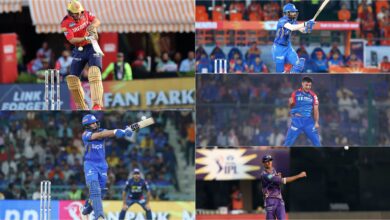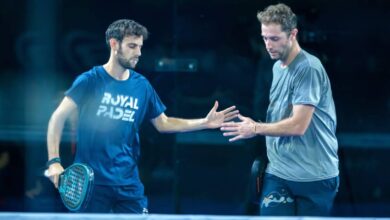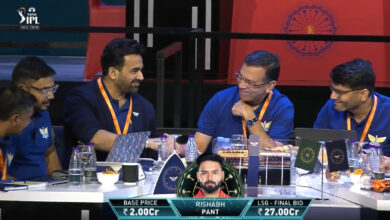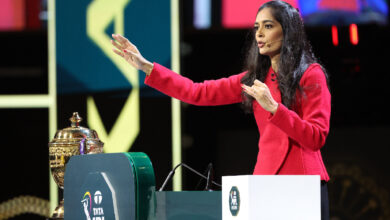Aman Sehrawat wins Paris Olympics quota: In wrestling’s time of chaos, Chhatrasal’s bright young hope brings a moment of peace | Sport-others News

If Indian men’s wrestling is all about tradition and passing the virtues from one generation to another, it may have found its rightful heir.He’s a wiry young man, all of 20 years old, with a perennially scruffy look and impassive, sunken eyes. But Aman Sehrawat also has shoulders built like bazookas, which rest on a rubber-like body that is blessed with blinding speed.
In the toughest of times for the sport in India – during a period when the country’s most celebrated wrestler, Sushil Kumar, was jailed; when almost all wrestling activities stopped last year due to the protests; and when one of the biggest stars, Tokyo Olympics silver medall Ravi Dahiya, got seriously injured – Sehrawat has remained the lone bright spot in men’s wrestling.
And so, it was unsurprising that it was Sehrawat, the youngest man in a long l of India’s Olympic aspirants, who saved India from the embarrassment of going unrepresented in men’s wrestling at the Paris Games.
The Asian champion, who competes in the 57 kg weight class, became the first male wrestler to secure an Olympic quota during the World Qualifiers in anbul on Saturday.
India can add to its tally on Sunday when Sujeet Kalkal, whose swift counterattacks were enough to take down some big names in the 65 kg category but came undone when he stumbled into reigning Asian Games gold medall Tulga Tumur-Ochir in the semifinal, which he lost. Sujeet will return to the mat again on Sunday, hoping to make the most of the second chance, also the last.
But on a day when India feared the worst after the Tokyo Olympics fifth-placer Deepak Punia went out cheaply in his first-round bout (86kg), it was Sehrawat who ended the long wait for a quota on his third jab at qualification.
Sehrawat’s rise in this curtailed Olympic cycle where Indian wrestling has had little to cheer for has been nothing short of meteoric. It started with a Cadet World Championship gold medal in 2021 followed the under-23 world title a year later. Still a teenager, he made a seamless transition to senior international claiming the Asian Championship gold in 2023, the year where he also won the Asian Games bronze.
But his quest to make the cut for the Olympics wasn’t so straightforward. At the World Championships last year, his first shot, he couldn’t make any impact but then again, it felt like the tournament came a little too early for him, still a freshman.
It was expected that he would seal the deal at the Asian Qualifiers last month. But when he was rolled over his opponent in the first round inside a few minutes, doubts surfaced over his abilities in the unforgiving world of Indian wrestling and there were murmurs of conducting fresh selection trials for the anbul qualifiers.
Indeed, Sehrawat himself had to grapple with the demons in his mind before he would wrestle his rivals on the mat. On the flight to anbul, the young wrestler wondered about the possibility of returning empty-handed yet again. He wasn’t alone in worrying about that outcome.
Even the US-Canadian commentary pair couldn’t hide their astonishment. Every time an Indian wrestler stepped on the mat on Saturday – there were six of them, one in each category – their crisp summary noted the recent Olympic success and contrasted it with a qualifying campaign where the men deeply struggled.
Given his stellar rise in this curtailed Olympic cycle, Sehrawat was expected to break the duck. And when the time came, he did it with minimal fuss.
He began the morning overwhelming Valentinov Vangelov of Georgia 10-4 and then returned a few minutes later to beat Ukraine’s Andrii Yatsenko on technical superiority (10-0). Sehrawat looked to be in his usual flow in the second bout, slipping between his opponents’ charging arms to get a grip on the right leg and converting them into takedowns.
In the winner-takes-all semifinal, Sehrawat found himself up against the tricky North Korean, Chongsong Han. Short in height and quick with his movements, Han tried to test Sehrawat’s patience circling on the mat, biding his time to use his speedy movements to score a point. As it turned out, that moment never came for the North Korean.
It was Sehrawat who used his long levers smartly to attack Han from a dance, without really putting himself in any danger. For years, his upper-body strength, long reach, explosive power, and speedy leg-work have been spoken about highly at New Delhi’s Chhatrasal Stadium.
On Saturday, when India needed it the most, he unleashed his weapons to outfox the North Korean wrestler. Sehrawat’s speedy leg attacks coupled with a watertight defence would have made the world and Olympic medall wrestlers from his alma mater proud.
Ravi Dahiya, Bajrang Punia, and Deepak Punia – who’ve all cut their teeth at Chhatrasal – might have had their Paris dreams all but cut brutally short. But in Sehrawat, India may have found a new wrestling hope to cling onto.







